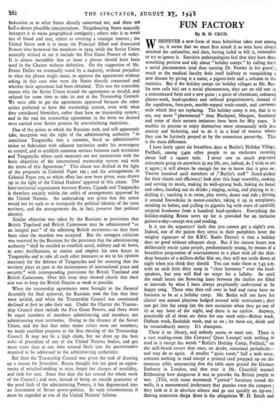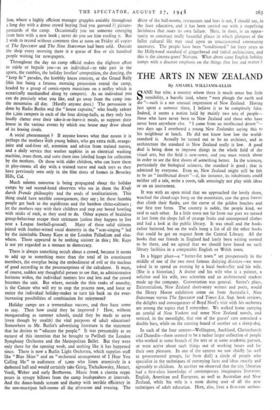FUN FACTORY
By R. H. CECIL
WHENEVER a new form of mass behaviour takes root among us, it seems that we must first attack it as men have always attacked the unfamiliar, and then, having failed to kill it, rationalise or try to ignore it. Sensitive anthropologists feel that they have done something positive and tidy about " holiday camps " by calling them a social phenomenon (and thus turning Dr. Fowler in his grave); much as the medical faculty feels itself halfway to vanquishing a new disease by giving it a name, a pigeon-hole and a column in the statistics. But if the holiday camps (or holiday villages as Mr. But- lin now, calls his) are a social phenomenon, they are an old one in a concentrated form and a new guise ; a guise of chromium, coloured plaster-work, loud-speakers and ordered gregariousness, instead of the aspidistras, fern-pots, marble-topped wash-stands, and careworn exile which they are replacing. The holiday camp is not, that is to say, any more " phenomenal " than Blackpool, Margate, Southend and some of their earnest imitators have been for fifty years. It enables its patrons to enjoy themselves more strenuously with less anxiety and bickering, and to do it in a kind of reserve where they can be furtively peeped at by the censorious passer-by. This is the main difference.
I have lately spent six breathless days at Butlin's Holiday Village, Pwllheli, among 5,400 other people in an enclosure covering about half a square mile. I never saw so much pop-eyed enjoyment going on anywhere in my life, nor, indeed, do I wish to see it again ; it will always be enough for me to know that it goes on. Twelve hundred paid members of ." Butlin's staff " (hand-picked for their charm and efficiency) look after this huge assembly, cooking and serving its meals, making its well-sprung beds, baking its bread and cakes, handing out its drinks ; singing, acting, and playing to it ; drilling it ; teaching it to swim, play tennis, dance and ride ; driving it around Snowdonia in motor-coaches, taking it up in aeroplanes, minding its babies, and pulling its gigantic leg with roars of carefully scripted bonhomie from a hundred loud-speakers. Everything the holiday-making Briton saves up for is prOvided for an inclusive guinea-a-day—except rest and reading.
It is not the organisers' fault that you cannot get a night's rest. Indeed, one of the points they stress in their pamphlets (over the weighty signature of the B.B.C. Radio Doctor) is that a holiday does no good without adequate sleep. But if for sixteen hours you deliberately excite 5,000 people, predominantly young, by means of a breathless programme of entertainment in a place with all the skin- deep beauties of a million-dollar film set, they will not settle down at night when you think they should. You can wake them at 7.45 a.m. with an arch little ditty sung in "close harmony" over the loud- speakers, but you will find no scope for a lullaby. So until the small hours the flowering lanes between the chalets are filled at intervals by what I have always perplexedly understood to be happy song. Those who then roll over in bed and curse have no business to be at a holiday camp. Mr. Butlin will not have his clients' one annual playtime hedged around with restrictions ; they can get into the camp (on the rare occasions when they go out of it) .at any hour of the night, and there is no curfew. Anyway, practically all of them are there for one week only—Bolton week, Oldham week, Rochdale week, and so on ; let them eat, drink and be tremendously merry. It's champion.
There is no library, and nobody seems to want one. There is a vast reading-room (the Campers' Quiet Lounge) with nothing to read in it except the words " Butlin's Holiday Camp, Pwllheli," on the mill-board covers that once, no doubt, contained periodicals— and may do so again. A smaller " quiet room," half a mile away, contains nothing to read except a printed card propped up on the immense table, announcing that the table once graced the German Embassy in London, and that over it Mr. Churchill warned Ribbentrop how dangerous it was to provoke the British people to war. (This, with some mammoth " period " furniture round the walls, is a monumental irrelevancy that puzzles even the campers ; they look at it in absolute silence and go out quickly on tip-toe.) Among numerous shops there is the ubiquitous W. H. Smith and
Son, where a highly efficient manager grapples amiably throughout a long day with a dense crowd buying (had you guessed ?) picture- postcards of the camp. Occasionally you see someone emerging from here with a new book ; never do you see him reading it. But I wish to record without comment that at noon on Friday all copies of The Spectator and The New Statesman had been sold. Outside the shop every morning there is a queue of five or six hundred people waiting for newspapers.
Throughout the day no camp official makes the slightest effort to cajole or beguile you—as an individual—to take part in the sports, the rambles, the holiday lovelies' competition, the dancing, the "keep fit" parades, the knobbly knees contests, or the Grand Rally (this last being a fatuous morning procession round ' the camp, headed by a group of comic-opera musicians on a trolley which is ecstatically manhandled along by campers). As an individual you can do precisely what you like, and go away from the camp into the mountains all day. (Hardly anyone does.) The persuasion is done by Radio Butlin and the " house captains," who loudly exhort the 5,zoo campers in each of the four dining-halls, as they only less loudly clatter over their take-it-or-leave-it meals, to support their house in the various events by which one house may draw ahead of its booing rivals.
A social phenomenon ? If anyone knows what that means it is perhaps the mothers with young babies, who get extra milk, orange- juice and cod-liver oil, attention and advice from trained nurses, and a daily service that washes napkins in an electrical washing machine, irons them, and sorts them into labelled heaps for collection by the mothers. Or those with older children, who can leave them in play-rooms all day with a trained nurse and such toys as they have previously seen only in the film shots of homes in Beverley Hills, Cal.
Much solemn nonsense is being propagated about the holiday camps by sad second-hand observers who see in them the Kraft durch Freude philosophy and the seeds of totalitarianism. This thing could have terrible consequences, they say ; let these humble people get back to the aspidistras and the bamboo china-cabinets ; let the mothers stay with their children and stop any bored howling with sticks of rock, as they used to do. Other aspects of brainless group-behaviour escape their strictures (unless they happen to live near a League football-ground). Many of these solid citizens joined with feather-witted vocal dexterity in the " scat-singing " led by the inimitable Danny Kaye at the London Palladium and else- where. There appeared to be nothing sinister in this ; Mr. Kaye is not yet regarded as a menace to democracy.
There is always something occult about a crowd, because it seems to add up to something more than the total of its constituent members, the overplus being the embodiment of evil or the nucleus of good according to the preconceptions of the calculator. It must, of course, sadden any thoughtful person to see that, as administrative horizons widen, the individual matters less and less and the crowd becomes the unit. But where, outside the thin ranks of anarchy, is the Canute who will try to stop the process now, and force or entice the individual holiday-maker to turn his back on the ever- increasing possibilities of combination for enjoyment?
Holiday camps are a tremendous success, and they have come to stay. Then how could they be improved ? How, without masquerading as summer schools, could they be made to serve (even though by stealth) the vital purposes of adult education? Somewhere in Mr. Butlin's advertising literature is the statement that he desires to "educate the people." It was presumably as an earnest of this intention that he brought to Pwllheli the London Symphony Orchestra and the Metropolitan Ballet. But they were only there for the opening week, and nothing like it has happened since. There is now a Butlin Light Orchestra, which supplies stuff like "Blue Skies " and an "orchestral arrangement of I Hear You Calling Me " to audiences of t,000 who listen attentively in a darkened hall and would certainly take Grieg, Tschaikowsky, Mozart, Verdi, Weber and early Beethoven. Music from a cinema organ pours in syrupy billows from the camp loudspeakers at intervals. And the dance-bands scream and thump with terrible efficiency in the neo-marzipan ball-rooms all the afternoon and evening. The
decor of the ball-rooms, restaurants and bars is not, I should say, in the least educative, and it has been carried out with a stupefying lavishness that roars its own failure. Here, in short, is an oppor- tunity to construct really beautiful places in which glimpses of the fuller cultural life may steal upon an unaccustomed community unawares. The people have been "conditioned " for forty years to the Hollywood standard of gingerbread and tinfoil architecture, and this is the cinema-goers' Nirvana. What about some English holiday camps with a discreet emphasis on the things that last and matter ?



































 Previous page
Previous page